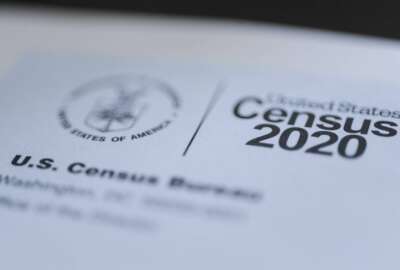Hubbard Radio Washington DC, LLC. All rights reserved. This website is not intended for users located within the European Economic Area.
On Air: Federal News Network
Trending:
IRS Commissioner questions congressional double-edged sword
IRS Commissioner John Koskinen said there is a disconnect in Congress as lawmakers continue to give the bureau more responsibility yet reduce its budget. He sai...
IRS Commissioner John Koskinen is on a public-persuasion tour in hopes of getting Congress to better fund his agency.
At his latest stop–the Urban-Brookings Tax Policy Center in Washington–Koskinen talked about the growing disconnect on Capitol Hill between giving the IRS more responsibilities while, at the same time, cutting its funding.
“Last December, just three days after cutting our budget by nearly $350 million, Congress passed legislation requiring the IRS to design and implement two new programs by July 1 of this year. The punchline is those programs–the Achieving a Better Life Experience (ABLE) Act and the certification requirement for professional employer organizations–didn’t come with any new funding,” Koskinen said. “But we are a can-do agency and we’ll play the hand we are dealt and we’ll do the best we can.”
Koskinen said the IRS had no choice but to follow statutory mandates. If they are not adequately funded, implementation will come at the expense of taxpayer services and enforcement, he said.
“It’s a strange position for us to be in. The IRS is such a capable agency that Congress keeps giving us new responsibilities. We deliver on those responsibilities and we deliver smooth filing seasons year after year. And then they tell us, ‘Well, we’ll give you less money and see how you do next year,'” he said. “Up until now, we’ve been able to manage, but I’m extremely concerned that the cracks are beginning to show.”
He said the idea of giving the IRS more responsibility and less money makes even less sense when he puts on his 20-year private sector hat, acknowledging that a company would never take its revenue-producing arm, set it aside, starve it for funds and see how it does. Koskinen said Congress needs to remember the IRS collects 92 percent of all the revenue that funds the government.
Tax cuts for tax cheats
The disconnect just isn’t around the collection of money. Koskinen said the IRS had to move people from doing audits to other areas of the agency to ensure those areas are meeting their statutory responsibilities.
That necessary change has both long-term and short-term effects. In the short term, Koskinen said, the IRS will catch fewer tax cheats and recover fewer improper payments.
In the long term, he said, it could impact the United States tax system that is built on voluntary compliance. He said, if there is a 1-percent decrease in that compliance because the IRS can’t audit or perform oversight, the country would lose $30 billion in revenue each year.
“So what you do is make a balancing decision to try to figure out how to minimize the negative impact of the cuts you are going to take,” he said. “We understand that depending on how you measure it, every revenue agent, revenue officer or criminal investigator reduces somewhere between $1.5 million and $1.8 million a year each.”
He said the government is leaving money on the table, which is why the cuts to the IRS budget have been called by some, “tax cuts for tax cheats.” The IRS says it will not have the staff to enforce tax laws and audit returns to find and recover more potential revenue.
“If we put more people into enforcement, we’d have even more miserable taxpayer service on the phone and in our walk-in centers because we don’t have enough people there anyways,” he said.
And just how “miserable” is it on the phone or in person? Koskinen said the $1.2 billion decrease since 2010 in the IRS budget has led to a decrease in its workforce of 13,000 employees, including 5,000 in the enforcement division, and a decrease in services to citizens, such as increased wait times to answer phone calls in the heart of tax-filing season. Nearly six in 10 calls go unanswered.
Make no mistake, Koskinen said, he understands Congress may not restore funding to 2010 levels or give the bureau the go-ahead to refill those 13,000 positions lost over the last five years. Like most agencies, the IRS must continue to find efficiencies in everything it does.
IT modernization plan
Some in Congress have said they deliberately cut the IRS’ funding to make the bureau think about the work it does and how it can be more efficient.
Koskinen said the IRS has been trying to do just that, saving more than $200 million in non-personnel efficiencies over the last few years.
But, Koskinen said, 75 percent of the IRS’ budget is personnel costs, so there is only so much it can do.
One of the ideas to drive more efficiency is for the IRS to move additional services online.
Koskinen said the IRS needs to look forward to create a new, improved agency in a cost-effective way.
“The online experience should give everyone confidence in knowing they can take care of their tax obligations in a fast, secure and consistent manner. The goal is not unrealistic. We are not trying to go to the Moon or Mars. We’re simply saying people should expect the same level of service when dealing with the IRS in the future as they have now from their financial institutions, whether it’s a bank, mortgage company or broker company,” he said. “The idea is taxpayers would have an account at the IRS where they or their preparers can log in securely, get all the information about their account and interact with the IRS as needed. Most things that taxpayers need to do to fulfill their obligations could be done virtually and there would be much less need for in-person help, either by waiting in line at an IRS assistance center or by calling in by phone.”
Koskinen said online services also would help with compliance issues where technology could highlight potential problems earlier.
Rosemary Marcuss, the director of Research, Analysis and Statistics at the IRS, said the new online services would give citizens and their tax preparers more control over their actions. Then the IRS could deploy more people to work with citizens who want or need personal contact, as well as put more people toward enforcement.
Marcuss said the taxpayers are bearing the cost of a low-tech IRS, whereas a high-tech IRS would reduce costs, which Congress is calling for in many ways.
Continued budget cuts means more risk
The IRS has made significant progress with some online efforts. Citizens used the “Where’s My Refund” service more than 187 million times so far this year. The bureau expects the final number to surpass last year’s total.
Citizens also have used the IRS’s “Get Transcript” feature to review, download and print their IRS account records more than 15 million times so far in 2015.
But Koskinen said developing more Web tools going forward will come at an expense.
“Even with our budget constraints, we are going to continue to find some funds to support these efforts to build toward the future, even at the expense of other activities,” he said. “Otherwise, if we just wage a guerrilla-style fight every year through the continuing funding challenges, focusing only on the present, we will wake up in five years and be no further down the road than we are today and, in fact, we will be five years farther behind.”
Marcuss said the IRS is developing plans, with budgets, for moving to these new online services. She said these are the first steps in this IT-services modernization process because the bureau must demonstrate that an investment in the IRS will not just reduce long lines, but bring the IRS closer to other financial organizations.
Should Congress continue to underfund the IRS, taxpayers and the entire tax system would be at greater risk, Koskinen said.
RELATED STORIES:
NTEU to Congress: You can’t starve the IRS
IRS declares enough is enough for hiring freezes
Obama budget to fix IRS service woes, says commissioner
IRS struggles to handle fraudulent tax returns under smaller budget
Copyright © 2024 Federal News Network. All rights reserved. This website is not intended for users located within the European Economic Area.
Jason Miller
Jason Miller is executive editor of Federal News Network and directs news coverage on the people, policy and programs of the federal government.
Follow @jmillerWFED
Related Topics





